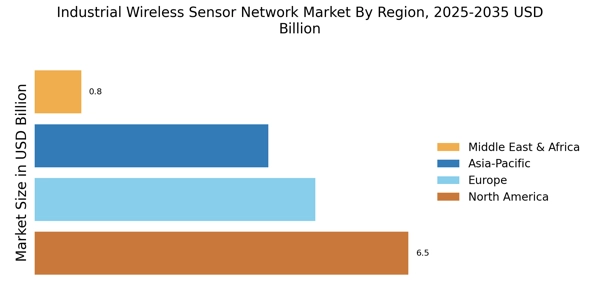Rising Demand for Automation
The Industrial Wireless Sensor Network Market is experiencing a notable surge in demand for automation across various sectors. Industries are increasingly adopting automated solutions to enhance operational efficiency and reduce human error. This trend is particularly evident in manufacturing, where the integration of wireless sensor networks facilitates real-time monitoring and control of processes. According to recent data, the automation market is projected to grow significantly, with estimates suggesting a compound annual growth rate of over 10% in the coming years. This growth is likely to drive the adoption of industrial wireless sensor networks, as they provide the necessary infrastructure for seamless communication and data exchange, ultimately leading to improved productivity and reduced operational costs.
Advancements in Sensor Technology
Technological advancements in sensor technology are playing a pivotal role in the evolution of the Industrial Wireless Sensor Network Market. The development of more sophisticated sensors, capable of measuring a wider range of parameters with higher accuracy, is enhancing the functionality of wireless sensor networks. For instance, innovations in micro-electromechanical systems (MEMS) and the miniaturization of sensors are enabling their deployment in previously inaccessible environments. This evolution is expected to expand the application scope of industrial wireless sensor networks, particularly in sectors such as oil and gas, where monitoring conditions in hazardous environments is crucial. As sensor technology continues to advance, the market is likely to witness increased investment and adoption, further solidifying the role of wireless networks in industrial applications.
Growing Emphasis on Energy Efficiency
The Industrial Wireless Sensor Network Market is increasingly influenced by the growing emphasis on energy efficiency. Organizations are under pressure to reduce energy consumption and minimize their carbon footprint, leading to the adoption of technologies that facilitate energy management. Wireless sensor networks play a critical role in this context by enabling real-time monitoring of energy usage and identifying inefficiencies. Data indicates that industries implementing energy-efficient practices can achieve reductions in energy costs by up to 30%. This trend is likely to drive the demand for industrial wireless sensor networks, as they provide the necessary tools for organizations to optimize their energy consumption and contribute to sustainability goals.
Increased Focus on Safety and Compliance
Safety and compliance are becoming increasingly critical in the Industrial Wireless Sensor Network Market. Regulatory bodies are imposing stricter safety standards across various sectors, necessitating the implementation of monitoring systems that ensure compliance. Wireless sensor networks are instrumental in this regard, as they enable continuous monitoring of environmental conditions and equipment performance. Industries such as chemicals and pharmaceuticals are particularly affected, where non-compliance can lead to severe penalties. Data suggests that companies investing in compliance technologies can reduce incidents by up to 40%. This heightened focus on safety and compliance is likely to drive the demand for industrial wireless sensor networks, as organizations seek to mitigate risks and adhere to regulatory requirements.
Integration with Smart Manufacturing Initiatives
The integration of industrial wireless sensor networks with smart manufacturing initiatives is a key driver for the Industrial Wireless Sensor Network Market. As industries transition towards smart manufacturing, characterized by the use of advanced technologies such as artificial intelligence and machine learning, the need for robust data collection and analysis becomes paramount. Wireless sensor networks facilitate this integration by providing real-time data that can be analyzed to optimize production processes. The smart manufacturing market is projected to grow significantly, with estimates suggesting a market size exceeding 300 billion dollars by 2025. This growth is likely to propel the adoption of industrial wireless sensor networks, as they are essential for achieving the data-driven insights required for smart manufacturing.
















